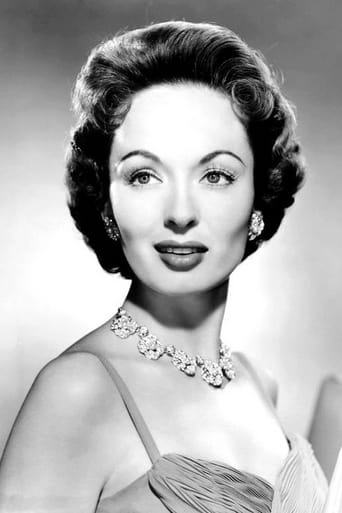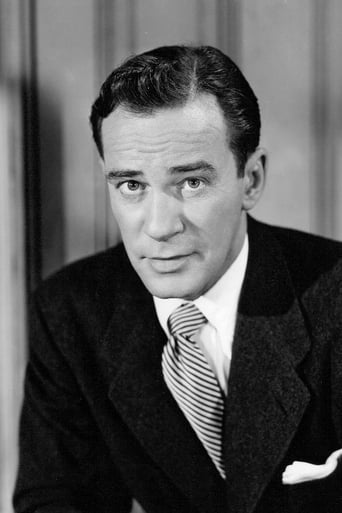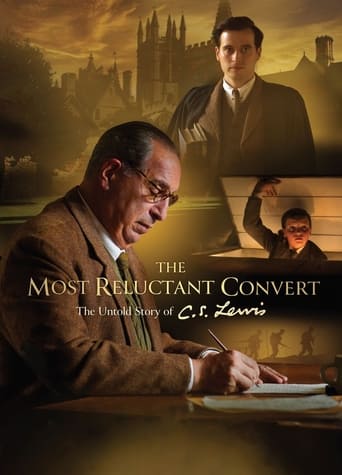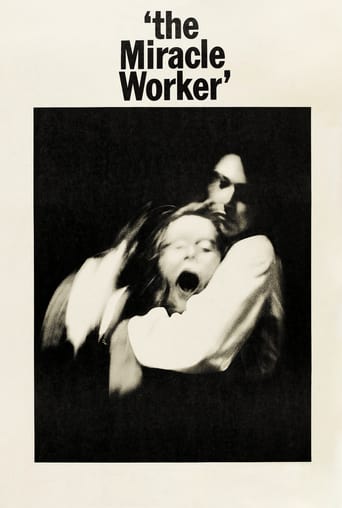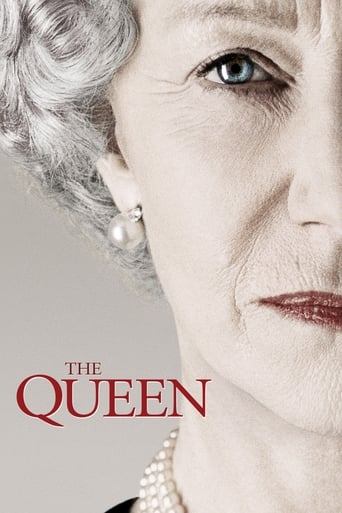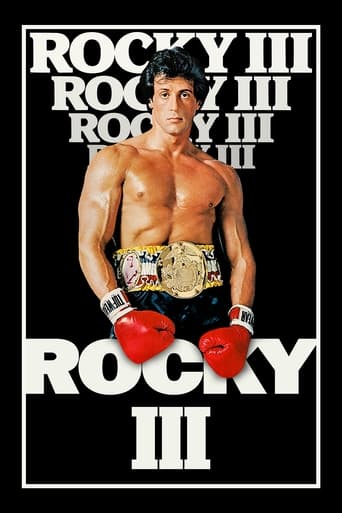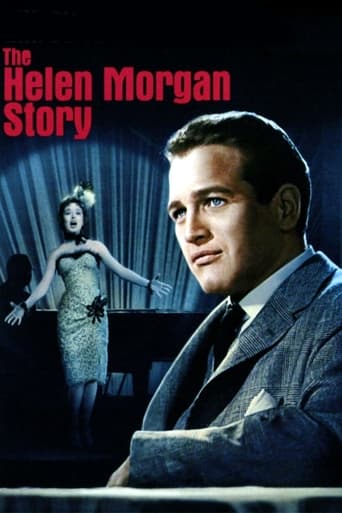
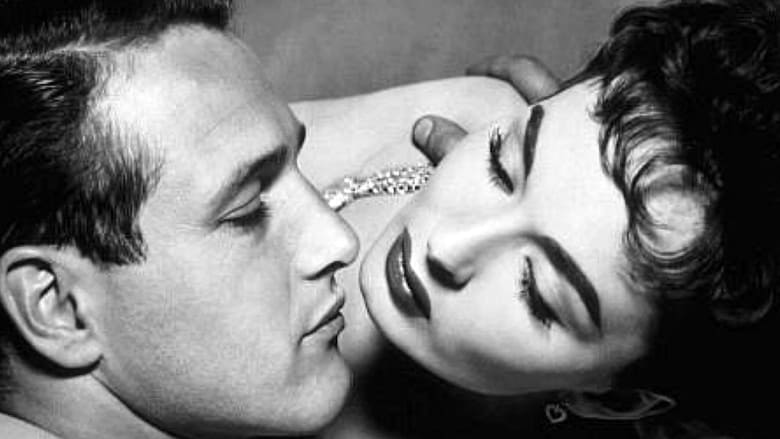
The Helen Morgan Story (1957)
Torch singer Helen Morgan rises from sordid beginnings to fame and fortune only to lose it all to alcohol and poor personal choices.
Watch Trailer
Cast


Similar titles
Reviews
I don't know a lot about Helen Morgan...just what I learned from Wikipedia. But here's the problem with this film. One possibility is that the film -- though somewhat fictionalized -- basically portrays Morgan as she was. In which case she was a pathetic sap. The other possibility is that the film portrays her unfairly as a pathetic sap. Either way, there's little reason for admiring Helen Morgan...at least based on this film.Ann Blyth can, at times, be a little shrill. Of course, the ironic thing is that even though Blyth was an accomplished singer, and had been in many movie musicals, Warner Brothers used Gogi Grant's singing voice throughout the movie. Frankly, if they weren't going to use Blyth for her voice, there were other, better actresses available. Although, I must say that the scene with DTs is quite memorable, as are the closing scenes.Those who love Paul Newman probably won't like him very much in this role. His character is as bad a cad as you'll find, dumping Morgan, slapping her around, and manipulating her and everyone to his satisfaction. A pretty pathetic character to be playing.More likable is Richard Carlson as the other love of Morgan, and a wealthy businessman at that. Alan King is not bad as a small-time confidence man, but the role is so clichéd as to be worthless. Cara Williams has a role as a dance hall girl-type.Interesting, three contemporaries to Morgan, each of whom she had a professional relationship with, appear in the film in sort of cameo roles -- Rudy Vallee, a very young columnist Walter Winchell, and famed song writer and Morgan's former accompanist Jimmy McHugh.I found the end of the movie, though well-acted, to be disappointing. If one didn't know better, one would think blue skies were ahead. They forgot to mention that she died of cirrhosis of the liver at the young age of 41.Although I would have preferred another actress in the role of Helen Morgan, this film does have a lot going for it. Recommended...at least once.
Mostly fictional, miscast biographical hogwash of hard luck songtress Morgan. Ann Blyth, in her last theatrical feature, was the wrong actress for the title role, many were considered she was probably the least suitable, so the film starts off with a major flaw from the get go. Judy Garland whose style especially when young was compared to Morgan's would have been ideal. Another shortcoming is that although Blyth was a singer whose voice was relatively close to the real Helen Morgan's she is dubbed by Gogi Grant, also a fine singer but completely different from Morgan in sound and technique. If they were going to dub her why not use Helen Morgan's voice? Curtiz direction is unremarkable here, a few of his more customary florid touches would have helped greatly. Paul Newman who was just starting out when this was made is adequate but missing that loutish air that is needed for the reptile he is playing either Kirk Douglas or Robert Ryan would have been more suitable. The real Morgan story is a compelling one so this comes off as a wasted opportunity.
Sitting through this exercise in self-congratulatory Hollywood tedium is enough to give you the shakes nearly as bad as those experienced by the title character.Helen Morgan (Ann Blyth) is a young singer from Danville, Illinois who dreams of seeing her name in lights. Stardom comes quicker than you can say the words "cheap montage," but with it comes gobs of heartache, mostly in the form of wrong guys and too much alcohol.Directed by Michael Curtiz and written by a credited committee of four, "Helen Morgan" throws up every convention of the time in which it was made, with no real heart in evidence. The New York Times called it "as heartwarming as an electric pad," which gets across the level of manipulation on offer even if it oversells the warmth by a few degrees.Blyth looks terrific, anyway, convincingly lip-synching Gogi Grant's off-camera singing. Paired up with a young and handsome Paul Newman as a shifty bootlegger named Larry Maddux, you get a lot of sex appeal, anyway.Right away you know you are in trouble, when we see Helen in a train while a group of Charleston-dancing men strum ukuleles and wear mink coats. It's the 1920s, in case you didn't know, a point that Curtiz continues to harp upon in scene after scene.Everything is force-fed to you in this film. It's all about the men in the world of Helen, as she gets pinballed from one bad thing to another, whether it's being left out to dry by Larry after a one-night fling, or later being caught masquerading as a Canadian for a beauty pageant.That's one of the few elements, by the way, which happened to the real Helen Morgan, but here it just serves as another installment of the pain parade Larry puts her through, not to mention her chance to meet another wrong guy who gets to disqualify her."I'm so ashamed," she tells him."There's one thing you don't have to be ashamed of," he replies. "Your looks. You're a very pretty girl."This counts for a gallant overture in this very dated, awkward film.Blyth isn't bad, just not very convincing. Forced as she is by a stupid script to never take a stand for herself, just drink more and more to register her pain, I'd say she does as good as she can.Newman's better, much better, mainly because he gets to make his choice comments from the sidelines while poor Ann has to drag this dead cat of a story on her petite shoulders. Playing anti-heroes became a specialty of his, and he does the best he can with this one.Judy Garland reportedly turned down the lead role in this production with the famous line "No more sad endings for me." Judy was smart; you can be, too. Unless you're a Newman completist, or a self-abusive depressive, give this one a miss.
Clearly inspired by other biopics like Love Me or Leave Me (1955) and I'll Cry Tomorrow (1955), this is another tale of a chanteuse whose career success is affected by booze and bad men. Helen Morgan was a star in the 1920's, a nightclub singer who crossed-over into theater for Flo Ziegfeld on Broadway in Showboat. However like so many others, a rapid ascent gave way to a slow decline.The screenplay by Oscar Saul, Dean Reisner, Stephen Longstreet, and Nelson Gidding, rationalises that the sado-masochistic love of Helen (Ann Blyth) for Larry Maddox (Paul Newman) is what brings her success and failure. Her alcoholism is an ironic symptom of the era of prohibition. Helen is ambitious, but her love for Larry tells us that she would give it all up if he would agree to marry her. However as Larry isn't the marrying kind, she is miserable, not a good state for an entertainer to be in. The lower class milieu that accompanies showbusiness is a breeding ground for these crooks, who see talented women as their meal ticket and a way to improve themselves, and it's no coincidence that Ruth Etting and Fanny Brice too had their troubles with gamblers. When Larry slaps Helen repeatedly and calls her a tramp, the scene could be from any number of biopics.The dialogue uses period slang for amusing affect eg 'You made those dames look like they were hanging out to dry', Larry is 'stuck on' Helen and tells her 'You're hooked'. When Helen is drunk at a rehearsal, it is said of her 'She's only running on 4 cylinders. It's the gasoline she uses'. The narrative has period oddities such as a lesbian at a rent party, and the wife of lawyer Russell Wade (Richard Carlson) who has an arrangement where it appears she too can be a lesbian, though she refuses to release her meal ticket. Helen gets the standard self-pity in 'I'm no good' and 'Everything I touch turns bad', and we hear the tale of the death of her father when she was a child (Freud, anyone?). However what no one seems to notice is that when Helen is appearing in Showboat and at her nightclub AND drinking, the plain fact seems to be is that she is overworked. Also when Ziegfeld offers her the part of Julie in Showboat that would make her famous, there is no indication that she can even act.Although the biopic is one of Hollywood's most corrupt genres - revisionist history existing as a star vehicle - it is redeemed when the person biographed is presented as a star. Although Ann Blyth can sing, her vocals are (inexplicably) dubbed, not with Morgan's recordings - Morgan died in 1941 - but by Gogi Grant. Grant's voice is lovely, has that Garland loudness and heartthrob sincerity for ballads, and is also able to jazz it up for 'On The Sunny Side of the Street'. Director Michael Curtiz only lets us see Helen as a star in two numbers - 'The Man I Love', and Why Was I Born?', both when she is supposedly drunk and of course, in perfect voice. Curtiz uses the genre standard cut-aways so we have others opinion of how wonderful Helen is, but otherwise we get Helen singing numbers interrupted or up-staged by drama. There are two other numbers which Helen completes in full - her two songs from Showboat performed in non-Showboat settings, Bill and Can't Help Lovin' Dat Man, but the songs are less showy.Blyth uses Morgan's signature scarf and sits on the accompaniest's piano as she sings, however often her buck teeth up-stage her. Blyth had been memorably directed by Curtiz in Mildred Pierce (1944) with Joan Crawford, and the later Helen recalls Crawford, in her stark make-up and, in a scene where she is required to tell a lie, where her face is a grimace. Curtiz uses expressionist camera-work to indicate Helen's drunken point of view, and the numbers she falters in when performing are camp - her tipsy rehearsal for 'Somebody Loves Me' wearing a hideous dress, and 'You Do Something to Me' where she falls off the piano. Curtiz cuts from her fall to a newspaper headline 'La Morgan stops Broadway show - flat on her face!'. When Helen is 'missing' on a drunken binge, she gets splashed by a passing car, and is ridiculed in a bar when she sings along to a radio broadcast of her own vocal. However, Blyth's screams of Helen in detox jump over camp into empathy.Curtiz uses the cringe-worthy orchestration of Morgan songs behind dialogue scenes - you can bet 'The Man I Love' gets a workout in the Helen/Larry scenes, but also the silhouette of someone who hangs themselves. Newman is too young for his role - he was actually older than Blyth when the film was made, but he seems younger - and his technique shows. But although he has practically nothing to do, Alan King is good to have around.


